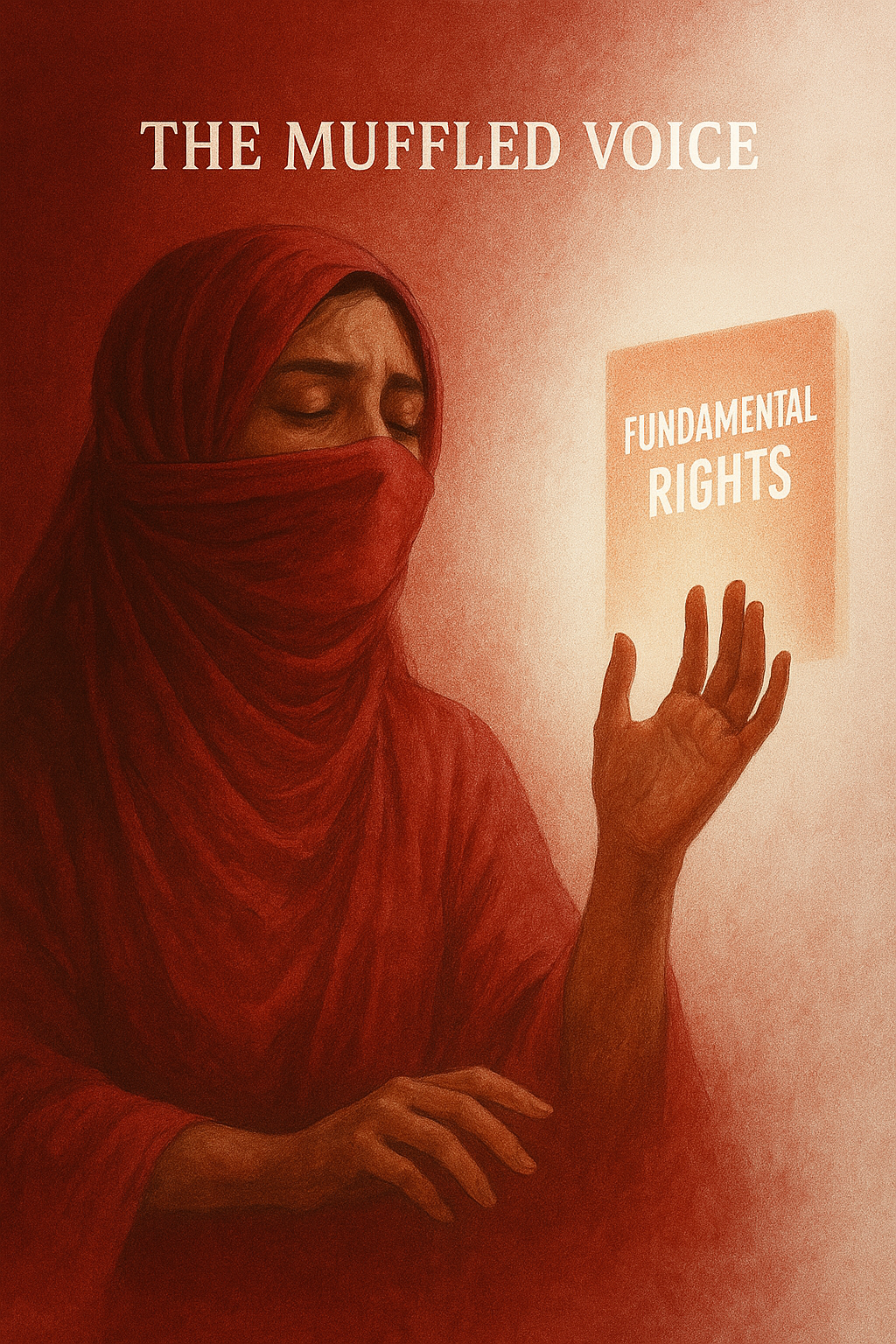Marital rape remains one of India’s most glaring legal blind spots—excluded from the ambit of criminal law despite mounting constitutional challenges, judicial scrutiny, and global human rights obligations. As of 2025, Exception 2 to Clause 2 of Section 63 of the Bharatiya Nyaya Sanhita, 2023 (which replaced the Indian Penal Code) continues to exempt a husband from rape charges if the act is committed against his wife, provided she is not under eighteen years of age. This exception is currently under challenge before the Supreme Court in a series of public interest litigations.
The core issue: Can the State legally deny married women the protection it offers every other citizen against sexual violence? Constitutional guarantees under Articles 14 (equality before law), 15 (prohibition of discrimination), and 21 (right to life and dignity) form the backbone of the legal challenge.
With the Supreme Court having issued notices and deferred hearings, and with mounting international criticism, 2025 could mark a decisive shift in India’s stance on marital rape.
The Legal Void: How Indian Law Treats Marital Rape in 2025
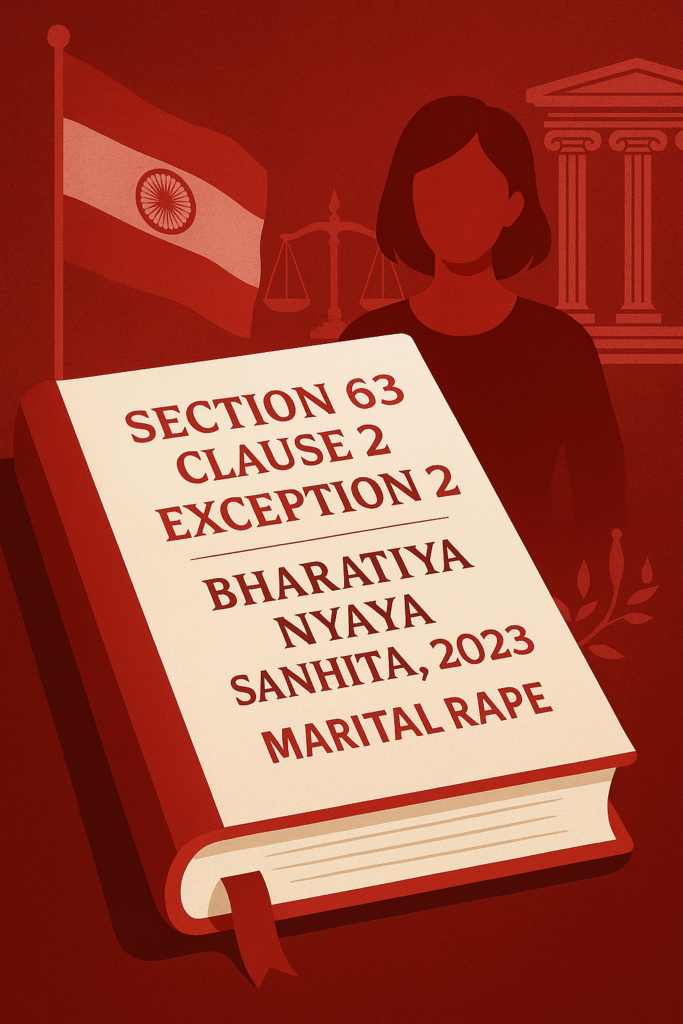
India is one of the few democratic nations that still refuses to recognize non-consensual sex within marriage as a crime. While Section 63 of the Bharatiya Nyaya Sanhita, 2023 criminalizes rape, the exception clause (carried forward from Section 375 of the IPC) carves out immunity for husbands.
The rationale for this exemption—rooted in outdated colonial jurisprudence from the 1800s—assumes implied, irrevocable consent within marriage. But this logic is fundamentally incompatible with modern interpretations of bodily autonomy, consent, and gender equality.
Despite minor legislative progress on related issues (like the 2013 Criminal Law Amendment Act), no government has yet acted to repeal the marital rape exception—even in the face of repeated court challenges.
Know the Law: Marital Rape Exception at a Glance
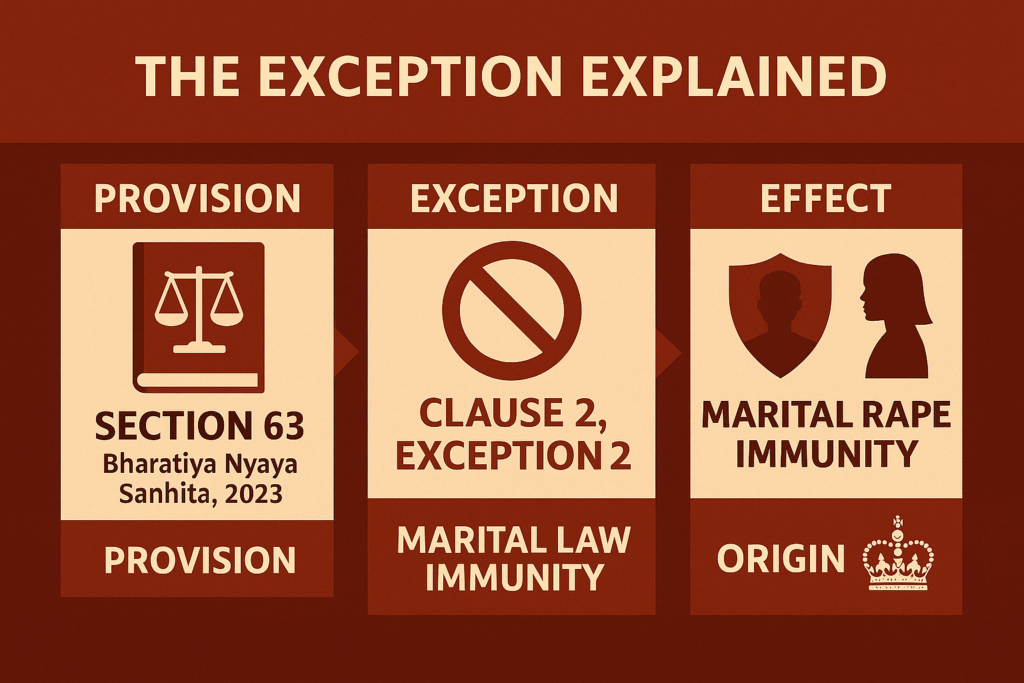
| Provision | What It Says |
|---|---|
| Section 63(2), Bharatiya Nyaya Sanhita, 2023 | Defines rape in India under the updated criminal code. |
| Exception 2 | States that sexual acts by a man with his own wife (not under 18 years) do not constitute rape. |
| Legal Effect | Grants blanket immunity to husbands from being prosecuted for rape, regardless of consent. |
| Origin | Carried forward from Section 375 Exception 2 of the IPC, based on colonial-era jurisprudence. |
Judicial History: A Pattern of Delay and Division
The landmark 2022 split verdict of the Delhi High Court in RIT Foundation v. Union of India reflected the judiciary’s internal conflict. Justice Rajiv Shakdher held the marital rape exception unconstitutional, while Justice C. Hari Shankar upheld it.
The result? A stalemate. The matter was escalated to the Supreme Court, which admitted multiple petitions, including those led by independent organizations and survivors, but substantive hearings have been repeatedly postponed.
In 2023 and 2024, the Union government sought repeated adjournments, citing the need for wider consultations. In 2025, the court has now framed the issue as a constitutional question, but a final decision remains pending.
When the Law Turned Away: Real Cases That Expose the Marital Rape Exception
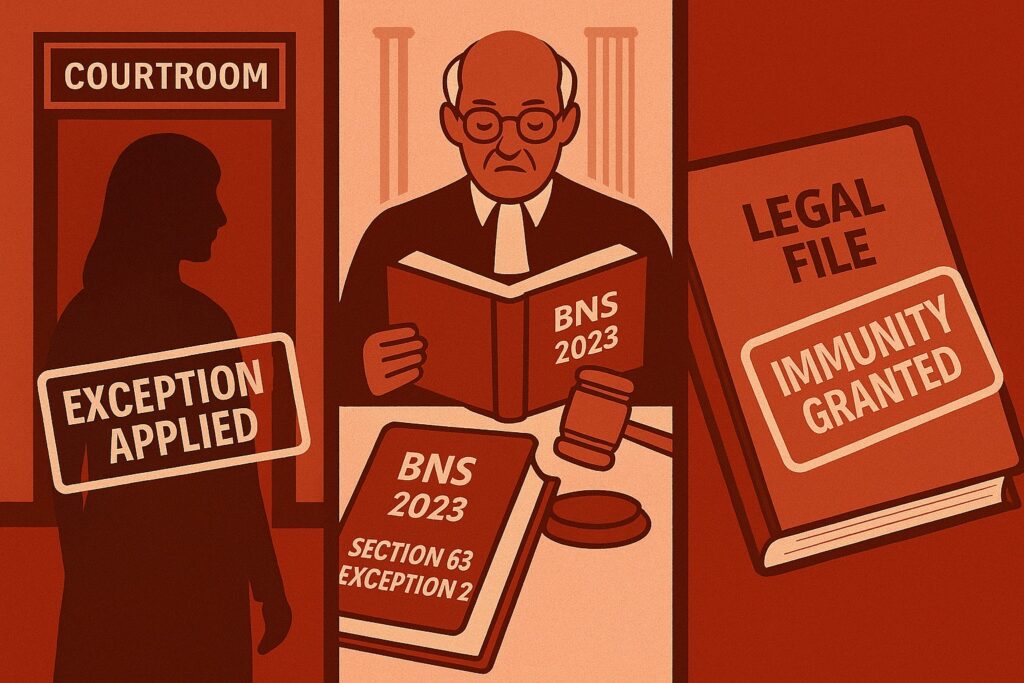
These anonymized real-world cases expose the severe gap between legal protections and lived experience:
Case 1 – Delhi, 2022
A 32-year-old woman alleged repeated non-consensual sex by her husband. Her complaint was dismissed.
“The offence of rape, as defined under law, excludes acts committed by a husband upon his wife. In the absence of legislative change, this court is constrained to follow the exception.” — Metropolitan Magistrate, Delhi
Case 2 – Mumbai, 2023
A woman facing separation accused her husband of coercion. The court noted:
“Even if the marital relationship is strained or nearing dissolution, so long as the marriage subsists, the protection of Exception 2 continues to operate.”
Case 3 – Kolkata, 2024
Sexual coercion was cited in divorce proceedings.
“Cruelty within marriage may justify divorce, but unless defined as an offence, it does not attract criminal consequences under the rape statute.”
These cases reveal the consequence of the marital rape exception: violence is acknowledged—but not punishable.
Constitutional Questions: A Direct Clash with Article 14 and Article 21
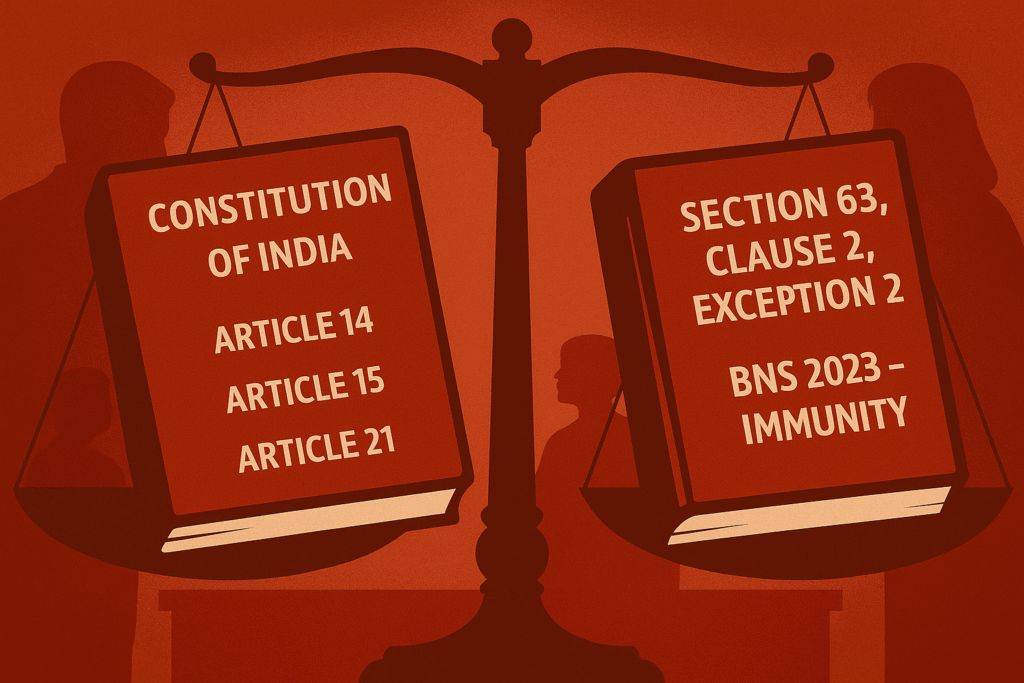
Petitioners argue that the exception violates:
- Article 14 – Unequal treatment of married vs. unmarried women
- Article 15 – Discrimination based on sex and marital status
- Article 21 – Denial of bodily autonomy, dignity, and liberty
As explored in our blog on digital access as a fundamental right, Indian courts have broadened rights interpretations—but the silence on marital rape persists.
Comparative Legal Insight: What Other Countries Have Done
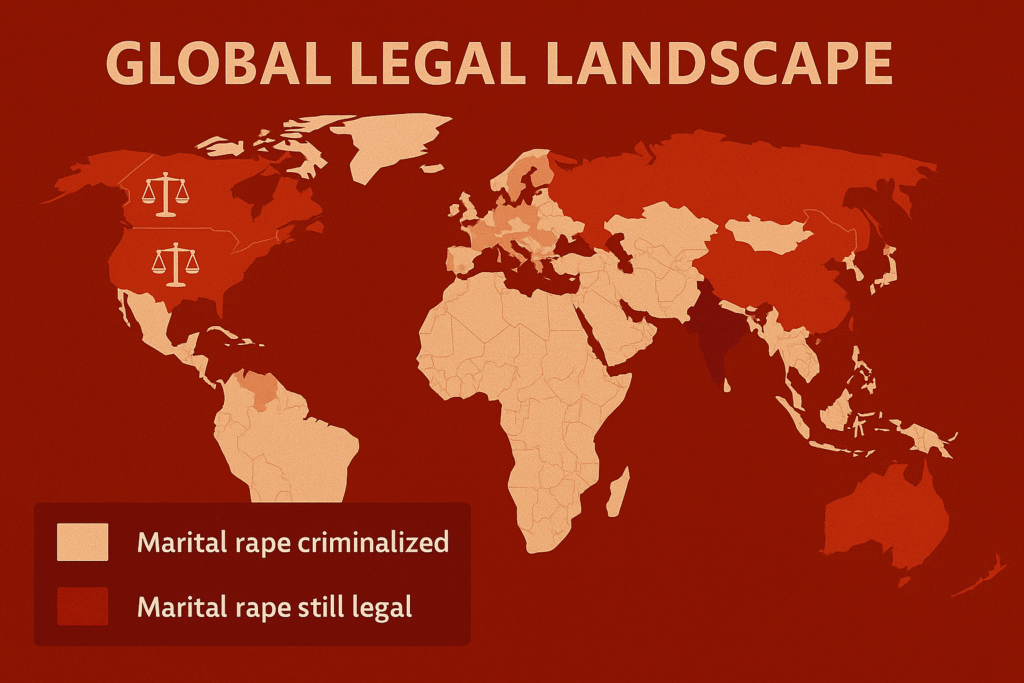
- UK – Marital rape outlawed in R v. R (1991)
- US – All 50 states recognize it as a crime
- Canada – Criminalized since 1983
- Nepal, Bhutan, South Africa – All have abolished it
India remains among fewer than 30 countries globally that still permit marital rape through legal immunity.
Timeline: The Road to Reform – India’s Marital Rape Debate

| Year | Milestone |
|---|---|
| 2012 | Verma Committee recommends repeal (ignored) |
| 2013 | Criminal Law (Amendment) Act retains exception |
| 2015–21 | PILs filed in High Courts and SC |
| 2022 | Delhi HC delivers split verdict |
| 2023–24 | Supreme Court defers substantive hearings |
| 2025 | Case framed as constitutional question |
Societal Challenges and Political Hesitation
Critics claim:
- It could destabilize marriage
- Potential misuse in family disputes
- Consent hard to prove in intimate relationships
But difficulty in proving a crime is not a reason to legalize it.
What Needs to Happen Now: A 4-Point Legal Reform Agenda
- Repeal Section 63 Exception 2
- Frame survivor-centric trial procedures
- Train police and judiciary for sensitive handling
- Run awareness campaigns about marital consent
LexNova View: A Legal Shield Should Never Justify Silence
“Constitutional rights are not annulled by wedding vows. The idea that marriage can immunize sexual violence is not just a legal fiction—it is a constitutional failure. The law must protect dignity, not deny it.”
Conclusion: A Constitutional Silence That Must Be Broken
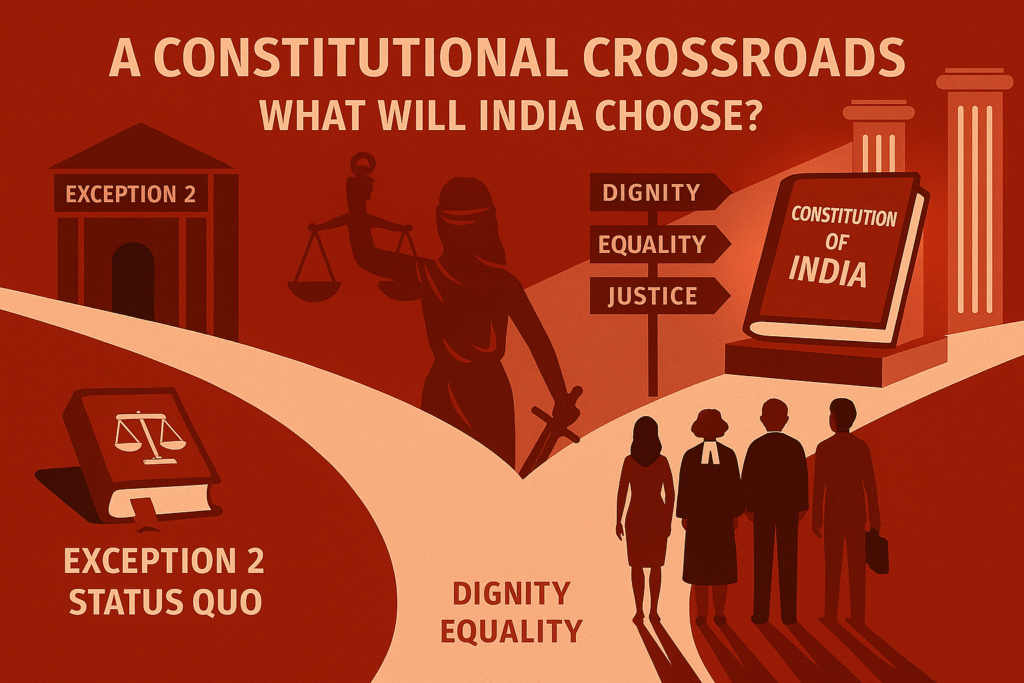
To deny the existence of marital rape is to deny married women equal protection under law. Until this exception is repealed, the voice will remain muffled.
References
- Bharatiya Nyaya Sanhita, 2023 – Section 63
- Delhi High Court – RIT Foundation v. Union of India (Split Verdict, 2022)
- UN Women Global Database on Marital Rape
- UK House of Lords – R v R (1991)
Read Also
Supreme Court Declares Digital Access a Fundamental Right
Explore how the Supreme Court’s digital rights ruling shaped the boundaries of personal liberty and state control—a foundational aspect for expanding bodily autonomy and privacy rights.
More legal perspectives at LexNova Consulting Blog
Need Legal Advice or Support?
If you or someone you know is facing legal uncertainty or needs confidential legal support regarding women’s rights, criminal law, or constitutional protection, we’re here to help.
Contact Us →
Your queries will be handled professionally, sensitively, and with complete confidentiality by our legal experts.

